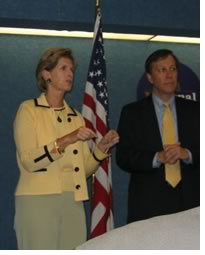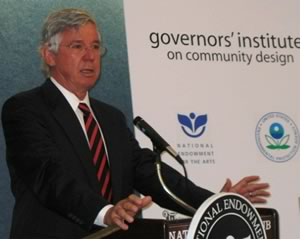

08/2005
New initiative modeled after Mayors’ Institute
The National Endowment for the Arts and the Environmental Protection Agency have teamed up with Smart Growth America and the University of Maryland to launch the Governors’ Institute on Community Design (GICD), an initiative to bring educational and technical assistance to help state leaders implement innovative design approaches for civic planning, growth, and development. The program builds on the NEA’s successful Mayors’ Institute on City Design, which is administered jointly by the American Architectural Foundation and the U.S. Conference of Mayors.
 The July 12 announcement marks the start of outreach to governors and
their staffs. “Too often, decisions are being made at the highest
levels without full access to this information,” said Jeff Speck,
NEA’s director of design. He also noted that through his work overseeing
the Mayors’ Institute and his experience as a city planner, the
reach of local officials only extends so far, with many decisions made
at the state level “that have a profound impact on the physical
form of local communities.” He said these decisions could “benefit
from a deeper understanding of the physical impacts of policy.”
The July 12 announcement marks the start of outreach to governors and
their staffs. “Too often, decisions are being made at the highest
levels without full access to this information,” said Jeff Speck,
NEA’s director of design. He also noted that through his work overseeing
the Mayors’ Institute and his experience as a city planner, the
reach of local officials only extends so far, with many decisions made
at the state level “that have a profound impact on the physical
form of local communities.” He said these decisions could “benefit
from a deeper understanding of the physical impacts of policy.”
EPA and NEA are each providing $200,000 to launch the Institute. Representatives of the federal agencies were joined by former EPA Administrator and New Jersey Gov. Christie Todd Whitman (R) and former Maryland Gov. Parris Glendening (D), who will spearhead the nonpartisan program. Former Maine Gov. Angus King will take part in future workshops. EPA Assistant Administrator for Water Benjamin H. Grumbles and NEA Chair Dana Gioia joined the governors at the announcement.
Building on mayors’ success
The Governors’ Institute builds on the success of the NEA Mayors’ Institute,
which since 1986 has graduated more than 675 mayors who have returned
to their communities with ideas on better city planning. “The NEA
has a positive track record of encouraging stewardship in public design
at the urban, rural, and now at the state level,” Gioia said. “Through
the Governors’ Institute, we will offer governors key resources
to help them address regional and statewide design issues.”
 U.S Rep. Kay Granger, a former mayor of Fort Worth, the city she now
represents in Congress, calls herself a vocal advocate for the MICD. “I
can think of at least three specific success stories that were the direct
result of my participation: Creation of a grand boulevard in the place
of a torn-down overpass, rebuilding of our downtown library, and reorientation
of the city toward its waterfront.” She said Speck was “on
the mark with his observations that it takes more than local leadership
to achieve success at the local level. The Mayors’ Institute is
a powerful and successful program. I am heartened that the governors
around the country will now have the same opportunity that I had to learn
what good community design is and how to build communities better through
intelligent planning.”
U.S Rep. Kay Granger, a former mayor of Fort Worth, the city she now
represents in Congress, calls herself a vocal advocate for the MICD. “I
can think of at least three specific success stories that were the direct
result of my participation: Creation of a grand boulevard in the place
of a torn-down overpass, rebuilding of our downtown library, and reorientation
of the city toward its waterfront.” She said Speck was “on
the mark with his observations that it takes more than local leadership
to achieve success at the local level. The Mayors’ Institute is
a powerful and successful program. I am heartened that the governors
around the country will now have the same opportunity that I had to learn
what good community design is and how to build communities better through
intelligent planning.”
“Air and water quality, brownfields, water infrastructure, and wetlands protection are all linked to how and where we grow,” Grumbles said. “Working in collaboration with the states, we will enhance our understanding of the implications of growth. Thinking strategically, the participating governors will help their states’ dollars go farther while protecting and preserving their environment.”
The NEA is working in cooperation with the Smart Growth Leadership Institute and the National Center for Smart Growth Research and Education at the University of Maryland; the first workshop this fall will focus on designing the program. In the next six months, the GICD will work with three states and then ramp up to four state events a year.
Copyright 2005 The American Institute of Architects.
All rights reserved. Home Page ![]()
![]()
 |
||
To
learn more about the new Governors’ Institute on Community
Design, visit their Web site.
|
||